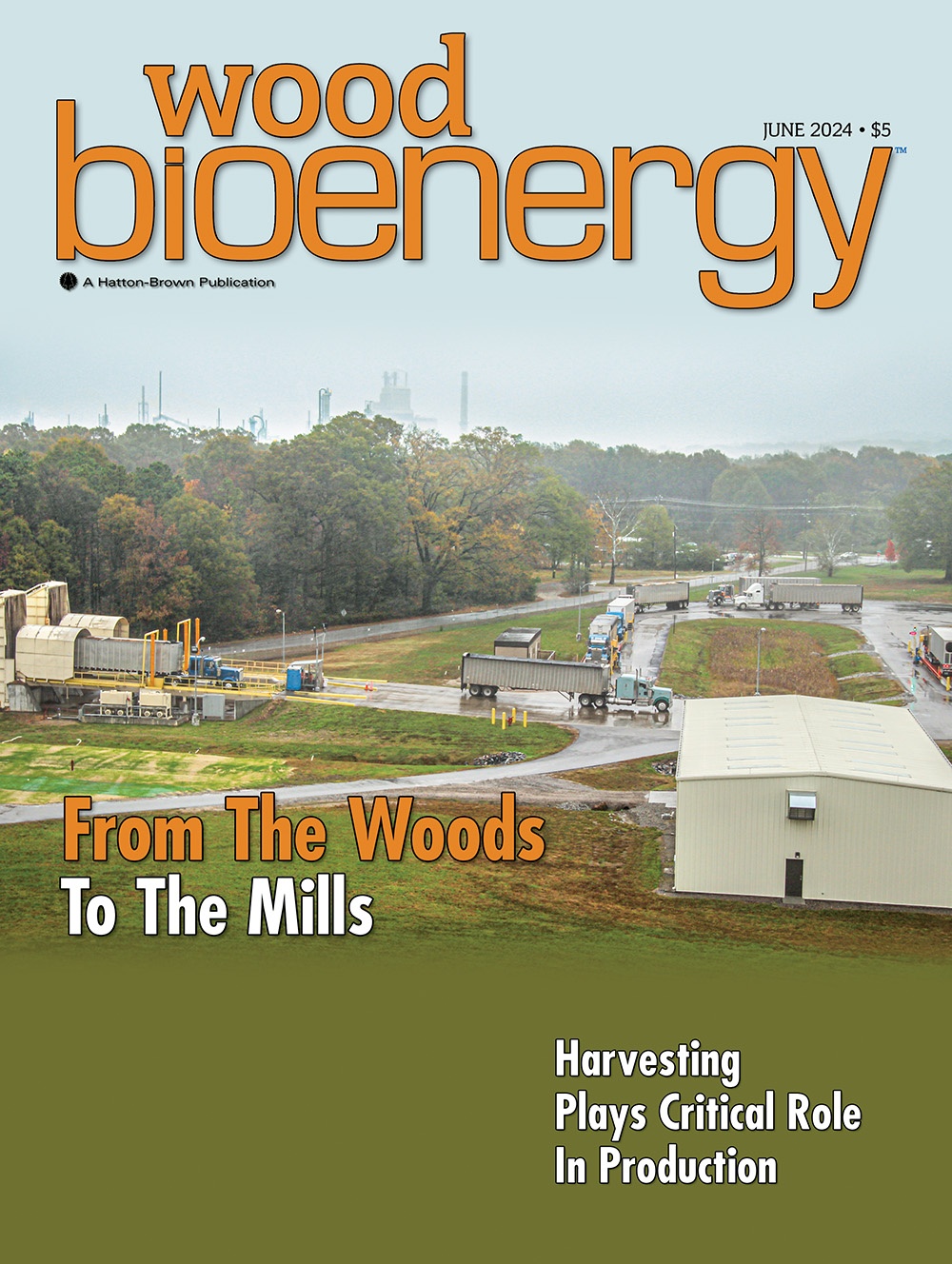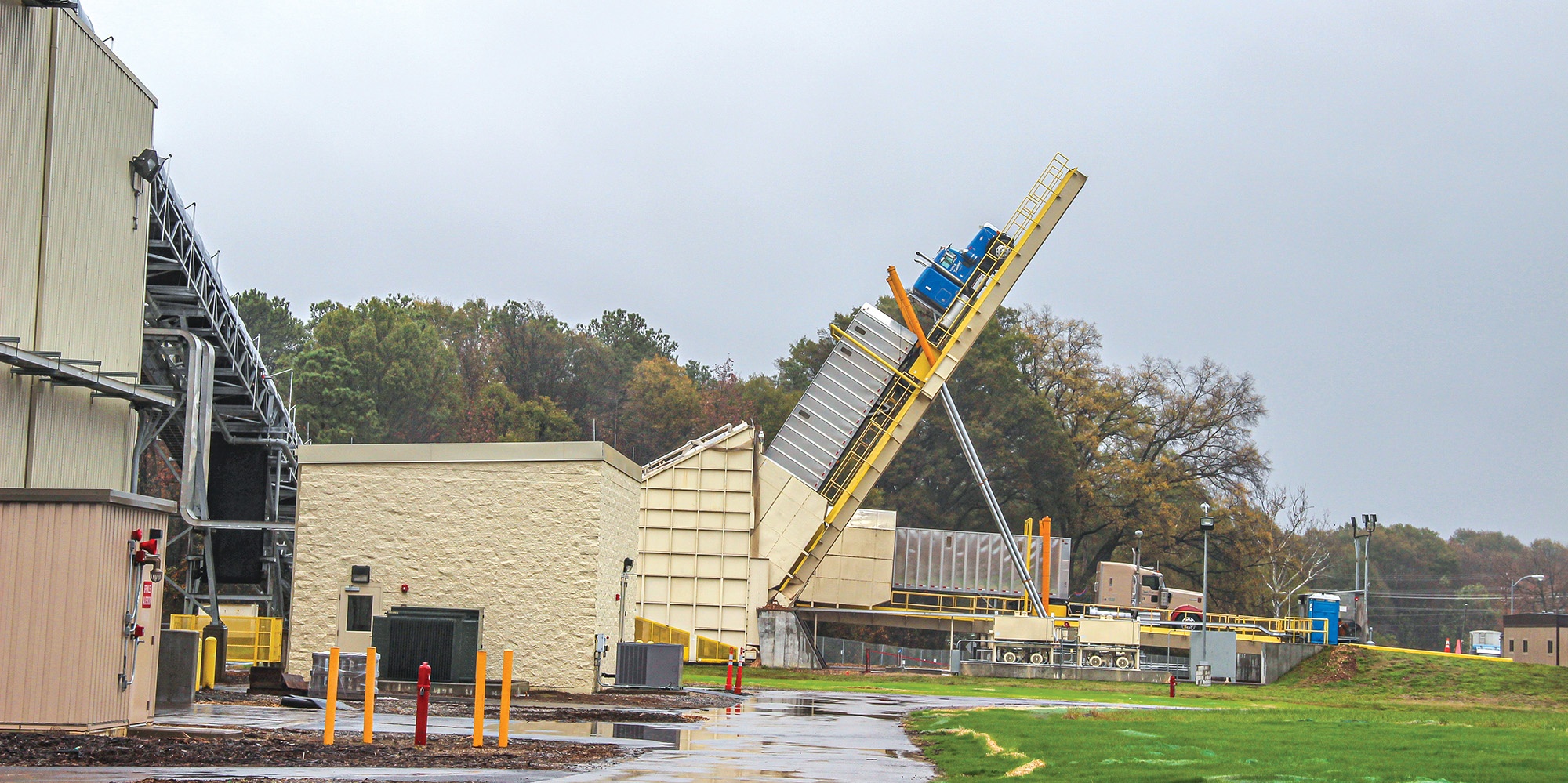Inside this issue
FROM THE EDITORS
COVER STORY
IN THE NEWS
- New Northwest Pellet Mill Moves Forward
- Collins Pine Sues Over Dixie Fire
- Mississippi Improves Hauling Regulations
- Is Climate Change New Enviro Weapon?
- Weyco Addresses Firefighting Issues
- DOE Funds Projects Focused On Biomass
- Georgia Ports Authority Is Prepared For Growth
IN-WOOD HARVESTING
- Air Burners
- Morbark
- Sennebogen
INDUSTRY COMES OUT TO EXPO RICHMOND
When the East Coast Sawmill and Logging Equipment Exposition, or just Expo Richmond as the event is more commonly called, returned for its 39th edition on April 12 and 13, attendees would not find themselves gathered at the show’s familiar former home at the Richmond Raceway, where it had been held for many years. Instead, this year Expo relocated to Meadow Event Park in Doswell, Va., still in the Richmond area but 27 minutes outside the city proper. When they concluded the last event in 2022, Expo’s show runners were not expecting to have to change venues this year, according to Executive Director Lesley Moseley. But when it came time for Moseley and exposition committee co-chairmen Jamie Coleman and Brian Bond to negotiate the contract with Richmond Raceway for 2024, the venue priced Expo out, doubling the cost and new restrictions that would have proved the event untenable.
Find Us On Social
From the Editors
A New Industry In the Northwest
The woody biomass industry has dominated the news cycle for the wrong reasons with Eastern U.S. industrial wood pellet producer Enviva filing for Chapter 11 bankruptcy protections and as reports continue to come out with exactly how much trouble Enviva finds itself in. We never want to see businesses closing, but it especially feels like a bit of the blow to the industry, as Enviva was constantly being flogged by The Dogwood Alliance.
Meanwhile, coming off the Pacific Ocean like a warm breeze is a wave of industrial wood pellet production plant announcements. This breath of fresh air could be the solution to a fair number of problems that have plagued the Northwestern U.S. for many years as wildfire, excessive regulations and mill closures are the norm. These troubles are starting to slide by the wayside as a “new” industry could be emerging as industrial wood pellets have begun coming on quite strong in the region.
As this issue reports: A final notice and approval for an air quality permit has been issued for Pacific Northwest Renewable Energy in Hoquiam, Wash. that has been over a year in the making, when supplier Prodesa drew plans for the 60-acre site that will produce approximately 440,000 tons/year.
Then of course, there is the previous announced Drax facility in Longview, Wash. which appears to be moving forward after overcoming the usual song and dance with a variety of environmental “interest” groups cropping up to “fight.” The deadline for submitting public comment to the Washington Southwest Clean Air Agency (SWCAA) was March 29, 2024.
Lest we not forget the two proposed pellet mills in California from the Golden State Natural Resources (GSNR), that during a Board of Directors meeting February 28, 2024 ratified a Memorandum of Understanding (MOU) between GSNR and Drax US BECCS Development, LLC regarding exploration of sustainable biomass development opportunities. This MOU provides a framework that allows GSNR and Drax to assess opportunities for joint action and confirms each party’s commitment to the vision of developing sustainable biomass initiatives that strengthen forest resilience and reduce the risk of catastrophic wildfire. This cooperative effort underscores the GSNR and Drax shared vision for developing creative solutions that sustainably strengthen forests and advance carbon negative green power solutions to combat global climate change.
Once again, industrial wood pellets seem to be the answered prayer for a region stressed by little to no markets for low value timber. Only time will tell if these projects will see production or not—we’re crossing our fingers.
From Left: Jessica Johnson, Managing Editor; Dan Shell, Senior Editor; Rich Donnell, Editor-in-Chief; David Abbott, Senior Associate Editor
Cover Story: Best Practices For Biomass Harvesting
In the 2023 General Assembly session of the Commonwealth of Virginia, HB2026 and SB1231 amended the Virginia Clean Economy Act (VCEA) to enable woody biomass to continue to be used as a source of electric power generation in Virginia and for specific biomass energy facilities to be included as eligible sources in the renewable energy standard. This legislation reflects the importance of biomass energy as a critical market for residual woody material from timber harvesting and from forest products manufacturing and addresses the need to ensure that woody biomass is produced and utilized sustainably.
The legislation directs the Virginia Department of Forestry (DOF) to develop best management practices (BMPs) for the sustainable harvesting of biomass by Dec. 1, 2023. In order for the biomass-fueled electric generation to qualify under the Renewable Portfolio Standard and be eligible for the sale of renewable energy credits, the biomass must be harvested in compliance with these biomass BMPs.
The legislation directs that the BMPs include a life-cycle carbon analysis (LCA), developed in coordination with the Virginia Department of Environmental Quality (DEQ) and relevant stakeholders, that includes all carbon emissions, including supply chain emissions, forgone sequestration, and the emissions from burning biomass resources for electricity generation.
The legislation further directs DOF to convene an advisory panel to examine a range of elements related to the use of biomass for electricity generation, including a life-cycle carbon analysis, and to submit a report of the advisory panel’s findings and any recommendations to the General Assembly by Dec. 1, 2024.
Benefits Of Utilization
The forests of the Eastern U.S. face many threats, such as: Exotic insects and diseases, invasive plants, deer populations, lack of natural fire regimes, fragmentation, climate change, and lack of thoughtful management which is related to the lack of diverse markets for forest products.
Forests that don’t offer income potential due to poor quality and/or lack of local markets are at greater risk of fragmentation or conversion to other land uses.
Woody biomass is beneficial for the electric power grid. A reliable form of dispatchable electricity generation, biomass is a renewable fuel source that does not add additional carbon to the environment like fossil fuels. Sustainable woody biomass can complement other renewable energy sources that can only operate intermittently such as solar and wind.
Fortunately, in the Eastern U.S., millions of acres of managed forests provide vast quantities of low-value or undesirable woody material. Because it is so readily available, woody biomass can serve as an economical bulk feedstock for electricity.
The Forest Inventory Analysis (FIA) program run by the USDA Forest Service in cooperation with state forestry agencies, provides routine assessments of the growth and utilization of all the forests in the country. This data shows the tremendous annual increase in the volume of wood (and stored carbon) accumulating in our forests. In Virginia, biomass used for electricity represents a small fraction of that annual growth.
This is one reason that landowners in Virginia do not plant or manage forests specifically for woody biomass. This market does little to incentivize forestry, but it does enable forest management by providing an economical outlet for undesirable or unmerchantable material that landowners want removed to achieve their land management objectives.
Want more content?
Wood Bioenergy is published and delivered 6 times per year tosubscribers worldwide. Readership includes corporate executives, mill ownership, mill management, logging contractors and equity venture interests. Wood Bioenergy is FREE to qualified readers.
Latest News
SFI President & CEO Kathy Abusow To Retire
Legacy Plant Converting To ‘Carbon Negative AI Factory’The Sustainable Forestry Initiative (SFI) has announced that President and CEO Kathy Abusow will retire in 2026, having led SFI through a period of significant expansion across North America, increasing reach,...
Legacy Plant Converting To ‘Carbon Negative AI Factory’
Legacy Plant Converting To ‘Carbon Negative AI Factory’Specializing in developing smaller carbon footprints for AI operations, New York-based NewYork GreenCloud (NYGC) has acquired the closed Buena Vista Biomass Power facility in Ione, Calif., with plans to convert...
John King Chains Celebrates 100th Year
John King Chains Celebrates 100th YearJohn King Chains Group is celebrating its 100th anniversary in 2026. Established in Leeds, England in 1926, the enterprise began by producing plain pedestal bearings for coal mining pit tubs. Expansion came with the rapid...
Weyco Wood Fiber Will Feed Aymium Biocarbon
Weyco Wood Fiber Will Feed Aymium Biocarbon Weyerhaeuser Co. and Aymium entered a memorandum of understanding (MOU) to partner to produce and sell 1.5 million tons of sustainable biocarbon annually for use in metals production. As an initial stage of this partnership,...
Webster Industries Purchases Renold
Webster Industries Purchases RenoldMPE Partners along with its portfolio company, Webster Industries, announced the closing of its acquisition of Renold plc, a leading designer, engineer, manufacturer, and supplier of premium, high specification industrial chain and...
Bioleum Corp. Acquires Hexas Biomass Inc.
Bioleum Corp. Acquires Hexas Biomass Inc.Bioleum Corp., which develops and commercializes technologies that convert lignocellulosic biomass into low-carbon fuels and refinery intermediates, has acquired Hexas Biomass Inc. Hexas is a global leader in the development...
Subscribe to Our Newsletter
Wood Bioenergy News Online hits the inboxes of subscribers in the wood-to-energy sectors.
Subscribe/Renew
Wood Bioenergy is published and delivered worldwide 6 times per year. Free to qualified readers in the U.S. Subscribers outside the U.S. are asked to pay a small fee.
Advertise
Complete the online form so we can direct you to the appropriate Sales Representative.



